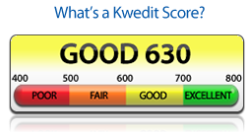If credit cards don’t lead to overspending, then Kwedit needn’t lead to any spending.
Positioned as an alternative payment method for purchase of virtual goods used in online games, the newly launched Kwedit only extracts a promise from you to pay in due course. If you break your promise, it doesn’t threaten to send goons to your house to collect. Instead, it affects your online reputation by  lowering your so-called “Kwedit Score”. You might be tagged as a credit risk in the Kwedit world as a result, but your kneecaps will be intact.
lowering your so-called “Kwedit Score”. You might be tagged as a credit risk in the Kwedit world as a result, but your kneecaps will be intact.
Smart alecks who’ve spoiled their Kwedit Scores by reneging on their promise(s) would be able to start on a blank slate by creating another Kwedit account using a different name and email. But, they’d quickly realize that the ‘blank slate’ extends to their online game: they wouldn’t be able to resume playing at whichever advanced level they’d reached while playing under their former identity. When they log on to the game with their new identity, they’d be bumped off to the first level like any new player. Since that’s so “uncool”, it acts as a deterrent to gaming Kwedit.
Kwedit says it’s meant for people who don’t possess credit / debit cards. However, it’s bound to tempt one-off gamers who do. After telling themselves “why pay by cash when you can pay by credit (card)” every time they’ve used their plastic in the past, they might suddenly start asking themselves, “why pay by credit (card) when you don’t have to pay at all (by Kwedit)?” As Mike Arrington points out in a recent blog post on TechCrunch, Kwedit poses the risk of cannibalism, “where a user chooses Kwedit instead of paying directly even though they have a credit card”. This would result in lost revenues for gaming companies. Without convincingly refuting this charge, Kwedit’s founders claim that it would eventually prove to be revenue positive.
Going by the rapid revenue growth of Zynga and other players, the online gaming industry has clearly established that it can attract enough customers who are willing to pay by GenY Mobile Payments if not by credit cards, debit cards and other conventional payment modes. Against this backdrop, it might prove exceptionally challenging for Kwedit to persuade online gaming companies to add Kwedit as one more payment method, especially when it poses the risk of tempting otherwise-paying customers to Kwedit, and thereafter into defaulters.
Kwedit might want to expand its target market to other forms of virtual goods where merchants would benefit more obviously from Kwedit’s ability to tempt users away from other payment methods. One low hanging fruit is American media companies who’re planning to charge their readers for access to online news and articles. Although many players in this market are apprehensive that their moves might drive their readers away – resulting in lowering of advertising rates – they’re forced to try out something in this direction because they recognize that their present practice of giving away content for free threatens their very existence. Unlike onling gaming companies, the key challenge for these media companies is not how to prevent paying customers from turning into non-paying ones. Grappling with the problem of converting non-paying customers into paying ones, they might find Kwedit’s allure working to their advantage. Kwedit offers them with a novel payment method that could convert a portion of their website visitors into paying customers – some because they can’t resist the novelty of Kwedit, and others, because they might not have a “rep to protect”!

Update:
Kwedit recently announced that it had a 26% repayment rate. In other words, 3 out of 4 people opting for Kwedit do not pay up.
According to one school of thought, even one paying customer out of four translates into a very attractive monetization proposition for game publishers who otherwise are able to convert only 1-3% of users into paying customers.
This logic is valid only if Kwedit’s numbers represent incremental customers who wouldn’t have otherwise paid by credit card or other payment methods. However, if game publishers discover that people opting for Kwedit have cannibalized their usual payment methods enjoying close to 100% repayment, they aren’t going to be too happy with Kwedit.
Hopefully, we’ll hear from them one way or the other down the road.
Pingback: The Death Of Cash Is At Least 190 Years Away | GTM360 Blog
Pingback: The Death Of Cash Is At Least 190 Years Away « Talk of Many Things